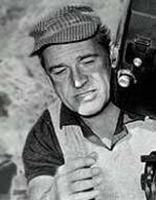 |
 |
Director - Feature filmography and DVDBeaver links:
A Dandy in Aspic (1968), The Fall of the Roman Empire (1964), El Cid (1961), Cimarron (1960), Man of the West (1958), God's Little Acre (1958), The Tin Star (1957), Men in War (1957), Serenade (1956), The Last Frontier (1955), The Man from Laramie (1955), The Far Country (1954), The Glenn Miller Story (1953), Thunder Bay (1953), The Naked Spur (1953), Bend of the River (1952), Quo Vadis (1951),The Tall Target (1951), Devil's Doorway (1950), The Furies (1950), Winchester '73 (1950), Side Street (1950), Border Incident (1949), Reign of Terror (1949), He Walked by Night (1948) (uncredited), Raw Deal (1948), T-Men (1947), Railroaded! (1947), Desperate (1947), Strange Impersonation (1946), The Great Flamarion (1945), Two O'Clock Courage (1945) Strangers in the Night (1944) |
|
|
||
|
Suggested Reading (click cover or title for more info)
Anthony Mann (Wesleyan Film)
|
After an apprenticeship making a string of remarkable B-pictures, Anthony Mann achieved his greatest success when he crossed over to the Western genre. Despite the epic settings of these films, Mann's roots as a noir stylist would prove central in his approach to landscape, which he filmed as psychological extensions for his characters complex emotional turmoil. Mann cherished the American landscape, and as such, his films feature pictorial Technicolor photography of not just barren deserts, but snowy mountains, majestic rivers, and lush forests, all of which were used to perfection and led to Mann becoming a defining maverick in exploring the possibilities of the Cinemascope frame. Emotional and physical violence were Mann's trade, and his films frequently adopted the classical themes of revenge, tragedy, persecution, and the patriarchal structure/crumbling of the family. Combined with his modern approach to storytelling, Mann's westerns have been described as meta-physical and/or Freudian. Together with longtime actor/collaborator James Stewart, and prolific screenwriter Philip Yordan, Mann would go on to make what are what are widely regarded as some of the purest examples of classic cinema to ever come out of Hollywood's golden-age. - Adam Lemke |
|
